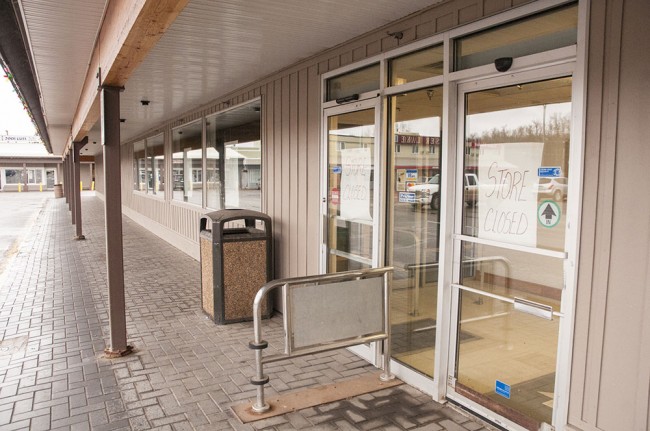
Photo Credit: Clarke Action Photography
When One Store Closes…
Food.
It’s something most of us take for granted. While we may supplement our grocery lists with a modest garden or trips to the farmers’ market, we rely heavily on what we can pick up in the aisles of our local supermarket: tomatoes from Mexico, oranges from China, bananas from Ecuador.
Not until your community’s grocery store disappears do you realize the importance of a reliable food source and the vulnerability of living in a relatively remote area like northern BC.
In June, SuperValu stores in Houston and Fraser Lake closed, leaving thousands of northern residents with nearly an hour’s drive to a supermarket. As winter sets in and highways become treacherous, the two locations remain empty, their shelves devoid of the goods that once sustained these communities.
The news isn’t all bad: In both towns, residents and local businesses have stepped up to make sure that no one goes hungry. Neighbours pick up supplies for neighbours, community services organizations go out of their way to help, and local businesses work to fill the void with one Fraser Lake businessman opening a new store in October. In many ways, the loss provides opportunity.
But while well-meaning, locally grown or locally sourced often can’t compete with the rock-bottom prices offered by chain stores, leaving the communities’ most vulnerable residents—those on fixed incomes or without transportation—with few options.
Fraser Lake
A community based on natural resources, Fraser Lake has seen its share of boom and bust. Endako mine’s closure two years ago affected more than 350 workers in this community of 1,100, which services a larger outlying area of 3,200.
As the population declines and real estate stagnates, those who remain are in a jam—selling their homes isn’t financially viable, but staying is increasingly difficult. And the issues seem to be compounding: without a grocery store, it’s become harder to attract locum doctors and other professionals.
“A lot of seniors are needing rides to get groceries in other communities,” says Sarrah Storey, a village councillor who runs Autumn Services Society for Senior Support with her mother-in-law, Elaine. They offer a food-share program—unused items can be brought in for redistribution—as well as a shuttle for grocery runs.
“We had a lot of moms running out of milk and eggs,” says Sarrah, who has given milk from her own fridge when the convenience store runs out. With two small children, she has seen her family’s costs increase, between additional fuel use and more frequent dining out.
As winter looms, she worries about the 45-minute drive to the nearest supermarket: “We have a lot of accidents yearly without people having to drive to Vanderhoof or Burns Lake or Prince George for groceries.”
May Reid has lived in Fraser Lake for 50 years and has no plans of leaving: “Where would I go?” says the great-grandmother of 10 who raised three children here. Never an out-of-town shopper, she has been using the local convenience store for groceries. “I don’t go out of town to shop because I depend on friends taking me.”
Her friend, Eileen Malchow, has also seen her share of changes during 49 years in the community. She wishes the current slump were simply part of the ups and downs of any resource community, but fears Fraser Lake may not recover this time.
“We’ve seen it every time there was a strike at the mine,” she says. “But this is a different type of slump.”
To the west
The slump may also be having a domino effect: When SuperValu closed its Fraser Lake store, delivering farther west to Houston became less cost effective and likely played a role in the second closure a week later. This forestry-based community has also had its share of economic woes, with the closure of its West Fraser mill three years ago.
Houston’s population is 3,200, but it services a larger outlying area of about 4,000 residents. Most affected have been lower-income families, of which the town has seen an increase.
As real estate prices rise on the coast due to touted industrial development around Terrace and Kitimat, more competitive housing in Houston becomes attractive. Houston Community Services Association coordinator Angelique Batley says the community has seen more than 300 families relocate there recently.
The biggest hurdle to not having a grocery store, she says, is the lack of public transportation to move those people between northern communities. “As we get into winter it’s going to get harder, so we’re struggling to come up with solutions,” she says. The association provides clients with monthly shuttles to Smithers, almost an hour’s drive away in good weather. In bad weather, they wouldn’t risk the unsafe roads.
Houston mayor Shane Brienen says while driving to Smithers or Prince George might provide a temporary solution, the practice is taking its toll on remaining businesses, as shoppers buy more than just their groceries elsewhere.
“It’s really important for us to get a store in there, not just for (grocery) shopping, but for the business community as a whole,” he says.
In the meantime, Houston’s Salvation Army food bank manager Marla McIntyre says she expects the holiday season to help. While it means a spike in demand, it’s also the time for an influx of donations.
“At Christmas this community just steps it up so unbelievably,” she says.
Farther west
At Bulkley Valley Wholesale in Smithers, store manager Mike Dandenault says the business, owned by the BC-based Jim Pattison Group, has been upping its service to Houston, with three trips a week instead of two to supply restaurants and stores.
Dandenault is keeping a wary eye on changes in his own community, as Loblaw Companies Limited, owner of SuperValu and Extra Foods, changes its Smithers location to a No Frills. With its “won’t be beat” slogan, No Frills offers competitive pricing, but it does so at a cost to the community.
During the transition, Loblaw has downsized its Smithers staff and reduced wages for remaining employees. When asked to elaborate on the changes, Tammy Smitham, vice president of external communications, was vague, saying in an emailed statement that, “No Frills store owners are focused on keeping costs within the
business at a minimum in order to deliver low prices to customers. While individual employee salary compensation discussions are confidential, No Frills is committed to treating employees fairly.”
Dandenault is more direct: “Our big thing is we support local,” he says, noting that the Wholesale employs roughly 70 mostly full-time staff (compared with about 25 let go from Houston’s SuperValu) and, depending on the season, carries products from roughly a dozen local suppliers.
Mark Fisher, a director with the Regional District of Bulkley-Nechako, says that food security occasionally comes up in discussions at the local government level, with the focus on supporting local agriculture. Earlier this year the regional district formed an agricultural committee to support local farming. When it comes to food costs, he adds that, pound for pound, consumers are getting more nutrition for their dollars when buying local.
Similarly, Sarrah Storey says Fraser Lake saw more gardens this year. Two new restaurants in the community attest to an increased market for dining out. Existing stores like the gas station, pharmacy and hardware store have expanded their food supplies to meet demand and, in late October, local entrepreneur Paul Dhaliwal opened a 4,200-square-foot grocery store, much to the community’s relief.
In Houston, two smaller stores, Houston Food Market and BV Foods, are credited with stepping up for the community, with the latter putting in a cooler so it could carry meat and produce. At press time, Houston residents were waiting on an announcement about a new grocery store, with rumours circulating that something may re-open by spring.
“We’re hopeful,” Mayor Brienen says.





